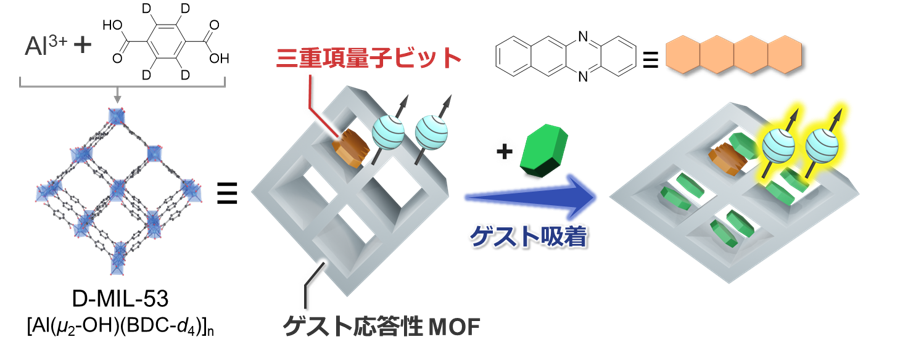DATE2024.09.10 #Press Releases
Quantum superposition states of molecular qubits respond to chemicals
- An important step toward the realization of chemical quantum sensing-
Summary
The quantum sensing, one of the quantum technologies including quantum computing, is a sensing technology that utilizes the quantum mechanical properties of qubits, and is expected to enable sensing with higher sensitivity and resolution than conventional methods. Among these techniques, the use of electron spins in molecules as qubits has been actively studied due to the high degree of structural freedom and uniformity of molecules. However, most of the studies on quantum sensing of molecular qubits have been limited to cryogenic temperatures, and there are few examples of strategies for sensing chemical substances using qubits, and the applicable chemical species are also limited.
The research group led by Akio Yamauchi, a graduate student at the Graduate School of Engineering, Kyushu University, and Nobuhiro Yanai, an associate professor (currently a professor at the School of Science, The University of Tokyo), in collaboration with Mizue Asada, a chief engineer, Toshikazu Nakamura, a team leader, Institute for Molecular Science, Pirillo Jenny, a project assistant professor, Masaru Hijikata, a project associate professor at the Graduate School of Engineering, Nagoya University, have proposed a quantum sensing method that can identify various molecules at room temperature.
In this research, by combining MOFs, which have a feature of changing structure depending on the guest molecule species, with triplet qubits available at room temperature, they developed a method to change the retention time of the quantum superposition state of the qubits depending on the type of guest molecule introduced. This achievement is expected to lead to the realization of chemical quantum sensors that take advantage of the diversity of combinations of MOFs and qubits. The research results were published online in Nature Communications, an international journal of Nature Research, on September 2, 2024 (local time).

Figure:Schematic diagram of this study. Molecular triplet qubits are introduced into MOFs whose structure is changed by guest adsorption, and the change in retention time (T2) of the quantum superposition state is measured when the guest is adsorbed.
Iinks:Kyushu University, Institute for Molecular Science, Nagoya University(in Japanese)
Journal
-
Journal name Nature CommunicationsTitle of paper


